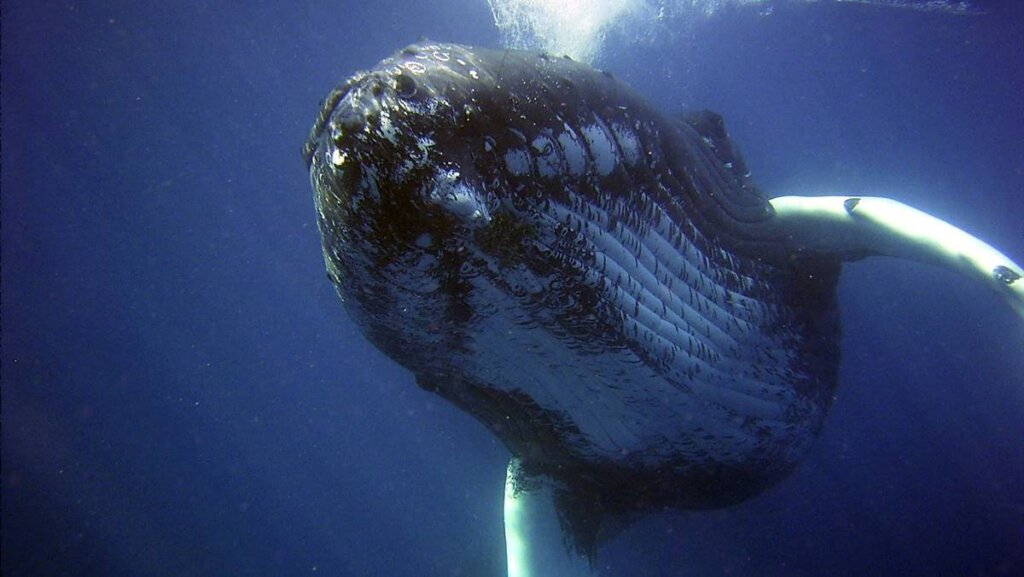Why Do Whales Sing?


Written and verified by the psychologist Valeria Sabater
The humpback lives in the cold Greenland Sea. This species of whale has the habit of varying its songs annually. It never fails. In fact, cetaceans have always caught our attention because of this singular faculty of emitting sounds, often endowed with harmony and complexity. Other times they’re limited to using simple bursts of clicks or high-frequency whistles.
Why do they do it? Why do they emit these songs? As a matter of fact, marine mammals, such as whales, dolphins, and porpoises, depend much more on sound than we do for survival. After all, in the aquatic environment, sight and smell lose part of their potential and functionality.
Sound travels four times faster in water than in air. It has more impact. Consequently, most mammals used to this scenario depend on sound to interact and explore. However, why do animals like humpback whales emit the most original, rhythmic, and captivating songs? Let’s find out.
Although both sexes sing, it’s the males who emit more complex and long-lasting tones.

Whales sing jazz
Whales are social creatures that live in groups of several individuals, called pods. They sing to communicate with each other, court each other, and even find out about the proximity of food and schools of fish.
The communication processes between all social groups fulfill these purposes. However, biologists and experts in bioacoustics (the study of animal sounds) suspect that such a complex register of clicks, whistles, and songs serves more purposes. Indeed, it seems it’s possible that these wonderful marine mammals also sing to themselves for pleasure.
Naturalists and cetologists warn of the risk that the increase in marine environmental noise poses to the lives of whales. Ships and constant marine seismic surveys are affecting their health and survival.
Humpback whales and jazz: singers who love to improvise
The psychologist, Eduardo Mercado of the University of Buffalo (USA) published a revealing study on the behavior of cetaceans. He suggested that whales, in effect, sing jazz. In fact, they’re capable of improvising their songs and display extraordinary acoustic qualities.
They don’t just create a sequence of sounds and repeat them, as birds do. Their creations are more spontaneous, flexible, and creative. What’s more, often, in the same group of whales, some copy, momentarily, the song of another and instantly vary the acoustic pattern, contributing their own ‘personal stamp’, just as jazz musicians do.
It’s the male humpback whales that produce the most complex and extensive songs. Indeed, they can spend hours broadcasting their songs and be heard more than 30 kilometers away. They sing in all seasons, but more frequently in the winter, the season that coincides with courtship and reproduction.
The function of their songs
Cetologists, as well as Dr. Mercado himself, emphasize that whales are intrinsically motivated to sing. In fact, they delight in it. Their emission of certain sounds, such as whistles or classic high-frequency clicks, has multiple purposes.
- The clicks allow them to differentiate between friendly creatures and predators. They’re also used to communicate with each other.
- Specific songs are used to warn of the proximity of a school of fish.
- Their sounds have echolocation functions. They resemble the acoustic register of bats more than birds.
- They also use non-verbal communication. With their tails and fins, they generate ‘slaps’ or blows on the surface of the sea.
Furthermore, experts emphasize the importance of differentiating social communication from the mere personal expressiveness of each individual whale. In fact, the idea that whales also sing to make themselves known is gaining increasingly more value. It’s thought they may even use their songs and vocal registers as sonar signals.
Different vocal ‘dialects’ have been found to exist between different groups of whale pods.
Whales sing and inspire each other’s songs
It’s been evidenced that humpback whales that occupy the same geographical area, sing similar songs, but with certain variations. Remember, they’re like jazz singers, capable of imitating acoustic pieces, but improvising them in their own way. As a matter of fact, the social learning of marine cetaceans is so striking that it’s inevitable that we compare it to human behavior.
Whales learn songs from each other and imitate them. It’s rather like when we learn the chorus of a song and hum it in our own particular way. Whales feed each other musically, inspire each other, pass acoustic patterns from one generation to another, and even form dialects between packs.
To conclude, while it’s true that we haven’t yet fully unraveled the mystery of why whales sing, there’s one indubitable piece of evidence. This is the fact that their songs both fascinate and disturb us. It’s as if they contain something atavistic, something that wavers between the mystical and the terrifying. Without a doubt, these gods of the ocean harbor secrets that we may never discover but, in the meantime, they deserve both our respect and our protection.
All cited sources were thoroughly reviewed by our team to ensure their quality, reliability, currency, and validity. The bibliography of this article was considered reliable and of academic or scientific accuracy.
- Helweg, D.A., Frankel, A.S., Mobley Jr, J.R. and Herman, L.M., “Humpback whale song: our current understanding,” in Marine Mammal Sensory Systems, J. A. Thomas, R. A. Kastelein, and A. Y. Supin, Eds. New York: Plenum, 1992, pp. 459–483.
- Frazer, L.N. and Mercado. E. III. (2000). A sonar model for humpback whale song. IEEE Journal of Oceanic Engineering 25: 160–182.
- Mercado, E., Ashour, M. & McAllister, S. Cognitive control of song production by humpback whales. Animal Cognition (2022). Doi: 10.1007/s10071-022-01675-9.
This text is provided for informational purposes only and does not replace consultation with a professional. If in doubt, consult your specialist.








